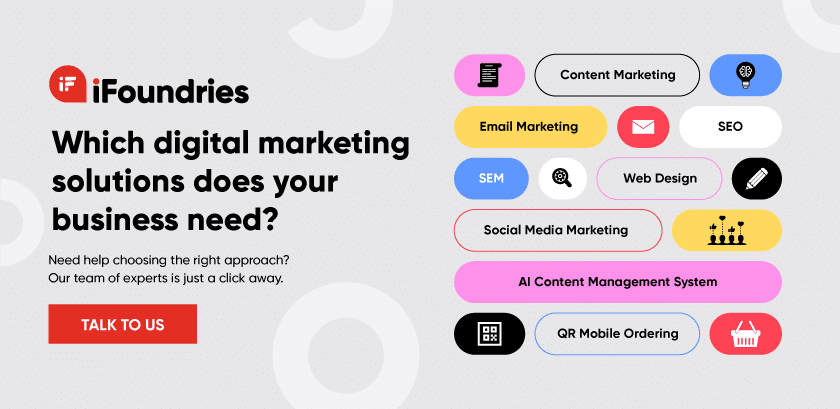“There’s Facebook and Instagram—they’re easier to access and manage, and I can connect with my audience directly, unlike websites, which are harder to maintain.”
As a small business owner, do you think the same way?
The first website went live in 1991, and since then, it has served different purposes to owners and users, whether for educational or business intents. Over the years, brands have drawn upon promoting their products for their digital marketing efforts using websites as the centrepiece of their strategy.
While this remains true and has been a common practice for enterprises, small business owners may think otherwise. Consider these numbers from a research study conducted by Zippia:
- At least 27% of small businesses don’t have a website
- 40% don’t want anything to do with it, and
- Over 20% of these businesses use social media to replace websites
Undoubtedly, operations for small business marketing have mainly been influenced by social media’s dominance, as people choose this channel over websites.
We see three reasons for this: resource and cost limitations, practicality, and, of course, the social media advantage.
The Social Media Advantage
Straight off, social media is accessible and far-reaching. 62.3% of the world’s population has already created accounts on different platforms. In Singapore, the digital landscape continues to be increasingly strong, with WhatsApp, Facebook, and Instagram being the country’s most used social media platforms.
You’re a small, growing business, and social media may be the most convenient and get-at-able digital marketing platform to reach your target customers instantly–we get it, and statistics of its extensive user bases heavily support the advantage you’ve been basking in.
Aside from an exponential consumer base, social media platforms provide business-friendly features that allow small businesses to perform and track their digital marketing efforts seamlessly. For example, Instagram, Facebook, and LinkedIn give owners access to insights to track the performance of their content.
We also have Meta Business Suite, a free tool from Meta that acts as a one-stop shop for managing your social media marketing activities on Facebook and Instagram. Here, you can schedule posts, get insights on online engagement and customer demographics, or communicate with your customers directly.
The thing is, social media doesn’t require too much technicality on a small business owner’s end when it comes to navigating the tools they’ll be using, as opposed to websites, where they may need to learn how to code, among other things.
Social Media vs Traditional Websites
While social media possesses a great deal of benefits for small business owners, it is worthwhile to look at the flipside and check how it differs from traditional websites according to strengths and weaknesses. Assess your needs better and look at both channel’s perspectives.
Social Media
Pros
- The audience is already there; the right strategy for engagement is key
- Directly interacting with customers is easier
- Easy to set up
- Creating social media accounts is free. You may likely spend on fees if using paid advertisements in your strategy.
Cons
- The influx of fake accounts is typical, putting credibility at risk.
- It is time-consuming since you must consistently post content to avoid boring your audience.
- You must follow the layout of the platform–there is no freedom in choosing the layout of your page.
- Dependent on algorithms, with limited analytics and no complete control
Traditional Website
Pros
- Increased credibility and online visibility
- A good competitive advantage
- Fully trackable, with excellent access to in-depth analytics
- Full ownership and control–there is no dependence on algorithm and platform popularity.
Cons
- Technical challenges and potential issues
- More challenging to connect with your audience due to a lack of personal interaction
- Requires technical skills, initial cost and maintenance–setting up may be complicated as well
- Time-consuming and may need a lot of effort and commitment
Delving deeper into why social media is the popular choice in a small business marketing effort
Cost and Resource Constraints
Creating a high-quality website can be resource-intensive, and on top of that, maintaining it needs additional effort and commitment as well.
That doesn’t end there–your website needs to be visible, and you can put your products on search engine results pages (SERPs) by writing SEO-driven content. However, it is also essential to note that organic web traffic is becoming competitive, so gaining online traction through search engine optimisation won’t truly be a walk in the park for your small business marketing effort.
Generally, all of these factors may cost you money for your small business marketing efforts and could be too much for small businesses or brands just starting.
Practicality for Small Businesses
Running a new or small business already squeezes out a lot of your time, and maintaining and keeping a website in check could be an additional task you may see as impractical or unnecessary due to available alternatives (like social media).
You can advertise your products or services through social media platforms and easily connect with the target audience, considering their interface is easy to learn and comprehend.
Additionally, tapping into social media is one of the cost-effective small business strategies you can use as a growing business with limited resources.
Social Media Dominance
Instagram and Facebook are economical online presence options with a wide-reaching influence on billions of active users. Its power to move individuals makes for an advantage that businesses can leverage when making their brand known.
Facebook, in particular, is an excellent place for businesses to interact with their audience, share content, and improve their online visibility. It offers business-friendly features, such as Facebook business pages, the Facebook Marketplace, and advertising tools, which can effectively showcase products, services, and brand stories.
However, in your small business marketing plan using social media, you must not forget that it will only be effective if you craft engaging content and strategically utilise its advertising capabilities as you connect with the target audience. This way, you’ll build solid social media branding that the audience can never forget.
But is social media really enough?
While social media may be the “go-to” or “ideal place” for small business marketing, is it strong enough to replace a website’s advantages when considering the big picture?
Here’s an overall view that you might be missing: as a small business, the intention is to grow even more through exposure opportunities that come your way. The only direction is to level up, and the key to achieving that goal is to have solid brand credibility, which only websites can truly fulfil. In this matter, trust and credibility carry a lot of weight.
The question is, do you want to stay as a small business forever? If your answer is no, then you may want to give websites a chance

This is how small businesses can benefit from having a website—supposing you have ever dreamt of being an industry leader in your niche, with a strong competitive edge among others, and are aiming for exposure to investment and global expansion with foreign partners in the long run. In that case, you’ll definitely need a website for your small business marketing pursuits.
The first thing you’ll need to make this vision into reality is authenticity, and a small business website is imperative for this ambition.
Here are some benefits you can consider:
Benefits of a Website
- Increases visibility
With websites, the whole world is within your reach. It helps you expand your customer base and reach out to distant clients who want to purchase from your brand. 60% of people perform online research using a search engine, and having a website with optimised content and design increases your chances of showing up on results pages.
- Better branding
Anyone can create a Facebook, Instagram, or WhatsApp account, but not everyone can create a website instantly.
Having one builds a reliable reputation for your business, showing that you are willing to take your business to greater heights and improve. It proves you are a professional and legitimate brand that customers can rely on. You can get a web design service to help you create a high-quality website from scratch.
- Complete Control
Having a website gives you full control over design, layout, terms, and whatever else you like. When there’s a social media blackout on platforms, you won’t have to worry about your business operations because you won’t be affected. Your content and web data will be safe.
- Beneficial for local businesses
Most local businesses do not see the need to have websites, but they are missing a multitude of potential. 46% of all Google searches include local intent, and 97% of users search online to find a local business. These numbers only show how local businesses benefit from search engines, and websites are the tools they need to show up in the results.
Social media supplements your online visibility needs but can’t fully replace the function of websites for your brand.
A small business in Singapore or any part of the world can benefit from using social media channels. Still, it doesn’t hide the fact that, sooner or later, your business can primarily benefit from creating a website as it grows.
Of course, creating one will depend on your ambitions and small business marketing goals. However, in the digital world with ever-changing digital marketing trends and consumer behaviour we need to adapt to; a website is the constant thing that can help you build the authenticity you need. Indeed, there’s no denying that websites are now crucial more than ever.






